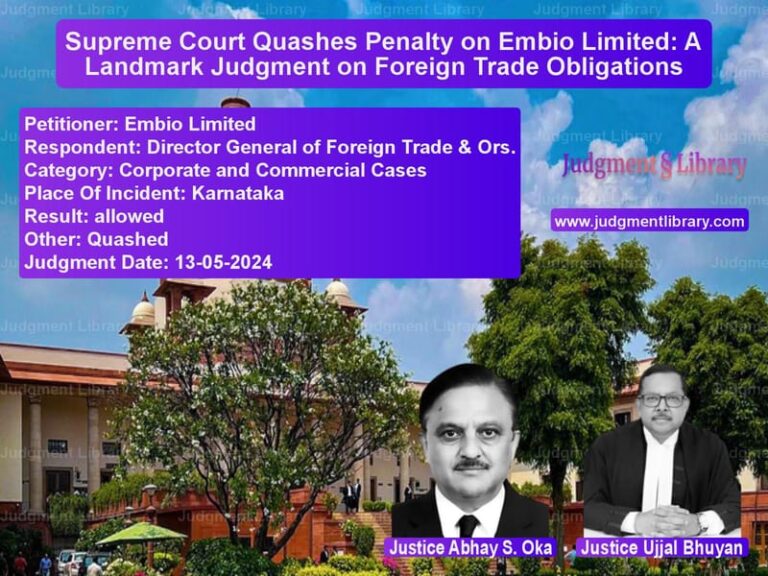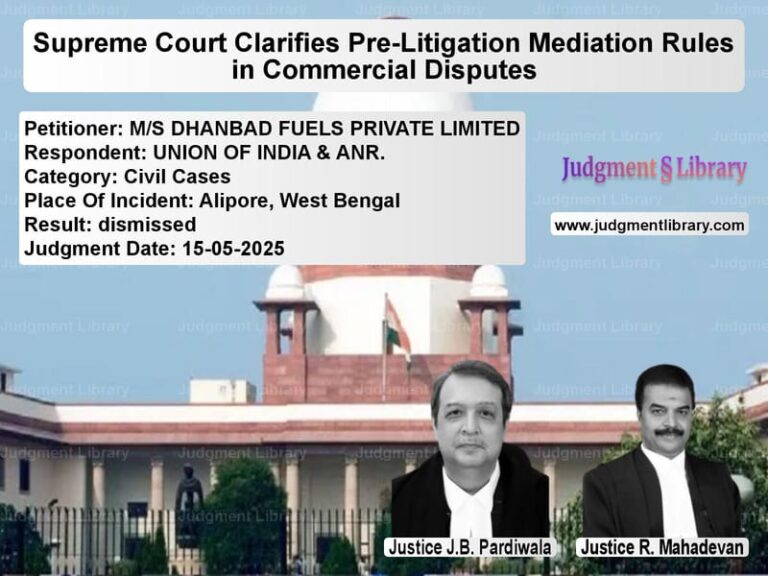Bihar School Examination Board Employees’ Absorption: Supreme Court’s Verdict on Service Continuity
The Supreme Court of India in the case of Mukesh Kumar & Others vs. State of Bihar & Others delivered a significant judgment concerning the rights of long-serving employees of the Bihar School Examination Board. This ruling addressed the issue of service absorption for employees who had worked under the now-defunct Bihar Intermediate Education Council (BIEC) and ensured that their employment was not arbitrarily terminated by the state government.
Background of the Case
The petitioners, Mukesh Kumar and others, were employees of the Bihar Intermediate Education Council (BIEC), which was dissolved under the Bihar Intermediate Education Council (Repeal) Act, 2007. The employees had been working in various capacities for decades, yet their employment status remained uncertain due to government inaction on their absorption.
Section 3 of the Repeal Act stated that employees of the dissolved council would continue in service and receive salaries until the government made a final decision on their absorption, retirement, or voluntary separation. The Bihar government constituted a three-member committee to determine the future of these employees, and the committee’s report provided guidelines for their absorption.
Key Legal Issues
- Did the Bihar government violate its obligations under the Repeal Act by failing to absorb the employees?
- Was the formation of a second committee necessary when the first committee had already recommended service absorption?
- Did the petitioners, who had worked for over 23 years, have a legitimate expectation of continued employment?
- Should the Bihar government be directed to act upon its own resolution regarding service absorption?
Arguments Presented
Petitioners’ Arguments
- The petitioners had been employed for over two decades and should not be forced into unemployment due to bureaucratic inaction.
- The three-member committee established by the Bihar government had already laid out a clear framework for employee absorption, yet the state failed to act on its recommendations.
- Employees were entitled to job security under the Repeal Act, which guaranteed continued employment until a final decision was made.
- Forming another committee to review employment status was unnecessary and caused undue delays.
Respondents’ (State of Bihar) Arguments
- The Bihar government contended that some employees did not meet the minimum service requirement for absorption.
- The state argued that the matter required further review and that an additional committee was formed to reevaluate the qualifications of employees.
- The government maintained that the initial resolution regarding employee absorption was not binding and subject to modifications.
Supreme Court’s Observations
The Supreme Court ruled firmly in favor of the petitioners, stating:
“Once the Committee, as per the Act, has submitted a Report, it was for the State Government to act in terms of the Report. For the implementation of the Report, there was no requirement for a further Committee.”
The Court further emphasized that the employees had worked for a substantial period, making it unfair to subject them to further uncertainty regarding their employment status.
Final Judgment and Directions
- The appeal was allowed in favor of the petitioners. The Court directed the Bihar government to act in accordance with the recommendations of the first committee.
- The Bihar government was instructed to finalize the absorption process within two months, considering that the petitioners had already worked for 23 years.
- The Court criticized the formation of an additional committee, stating that it was unnecessary and led to unjustified delays.
- The state government was directed to ensure that the petitioners received their rightful employment benefits without further bureaucratic obstacles.
Legal and Practical Implications
The judgment reaffirmed the principle that employees cannot be left in limbo due to government inaction. The ruling set an important precedent for cases involving the absorption of employees following organizational restructuring or the repeal of statutory bodies.
Impact on Employees and Governance
The Supreme Court’s ruling provided much-needed relief to long-serving employees who had been uncertain about their future. The judgment also reinforced the importance of governmental accountability, ensuring that commitments made through legislative actions are honored.
Conclusion
This landmark ruling from the Supreme Court ensures that employees who have given decades of service are not left in uncertainty due to bureaucratic inefficiencies. By directing the Bihar government to complete the absorption process within two months, the Court upheld the rights of employees and set a precedent for fair labor practices in government employment.
Petitioner Name: Mukesh Kumar & OthersRespondent Name: State of Bihar & OthersJudgment By: Justice Kurian Joseph, Justice Mohan M. ShantanagoudarJudgment Date: 13-02-2018
Don’t miss out on the full details! Download the complete judgment in PDF format below and gain valuable insights instantly!
Download Judgment: Mukesh Kumar & Other vs State of Bihar & Oth Supreme Court of India Judgment Dated 13-02-2018.pdf
Direct Downlaod Judgment: Direct downlaod this Judgment
See all petitions in Employment Disputes
See all petitions in Public Sector Employees
See all petitions in Termination Cases
See all petitions in Judgment by Kurian Joseph
See all petitions in Judgment by Mohan M. Shantanagoudar
See all petitions in allowed
See all petitions in Remanded
See all petitions in supreme court of India judgments February 2018
See all petitions in 2018 judgments
See all posts in Service Matters Category
See all allowed petitions in Service Matters Category
See all Dismissed petitions in Service Matters Category
See all partially allowed petitions in Service Matters Category







